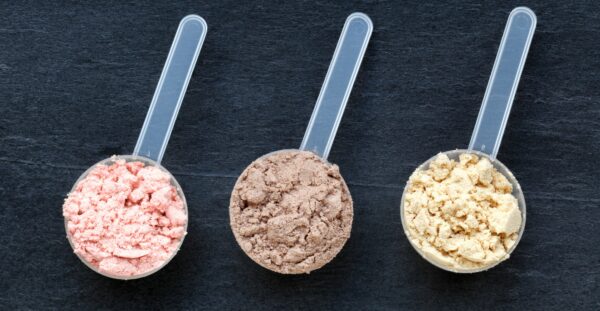Proteins: choosing the right ones for your nutrition concepts

Proteins are key ingredients in sports nutrition formulations. Plant-based or animal proteins, casein or whey, isolate, etc. Which proteins are best suited to your product? Read our article to find out.
Proteins: definition and roles
In the nutrition market, several products are protein-based. Used in several areas, the most relevant segment of this market is sports nutrition. Indeed, regardless of the sport, athletes need a high-protein diet.
Proteins, macronutrients essential for staying healthy
Proteins are large organic molecules composed of smaller molecular units called amino acids.
Proteins play numerous roles in the body. They help regulate vital constants, transmit nerve messages and transport other molecules. They can be enzymes, structural proteins, transporters or messengers.
In short, proteins are considered as the building blocks of the body, because they are the source of its construction and operation.
Like all macronutrients, proteins have an energy value. The consumption of a protein represents 17 kJ, or 4 kcal.
The stars of the nutrition market
Because of the different functions that proteins can perform, they are essential to the proper functioning of the human body. They can therefore be used in various types of products in different segments of the nutrition market. They are found in sports nutrition, joint comfort and healthy ageing products alike.
Formulation: which protein to choose?
Different types of proteins can be included in product formulations. Each has a specific amino acid composition and specific properties that make different applications possible.
Casein, whey or collagen, the choice of protein will depend on your target group and the action desired.
You will need to adjust the formulation of the product and choose its active ingredients to meet these criteria.
Egg protein: the most complete of all!
WHO has ranked egg protein as the protein reference due to the quality of its amino acids.
Egg proteins help repair and maintain tissues, including muscles.
Egg proteins can therefore be used in several segments of the nutrition market.
In addition to its nutritional strengths, egg protein is a low-cost protein ingredient.
Plant-based proteins
Peas, soya, rice, lupin, hemp, etc., plant-based proteins are all the rage!
Much sought after for high-fibre vegetarian or vegan sports nutrition product formulations, these proteins are in vogue.
However, care must be taken regarding the aminogram of the finished product.
This is because plant-based proteins may have deficiencies in essential amino acids, which are: histidine, methionine, tryptophan, threonine, phenylalanine, lysine, leucine, isoleucine and valine.
JLB DEVELOPPEMENT, a specialist in protein product formulations, can offer you advice on choosing complementary protein sources and thereby improve the protein profile of your products.
Whey protein
In the sports nutrition market, the most popular protein is lactoserum, more commonly known as whey. This protein plays a key role in muscle mass gain, also called anabolism. Combined with casein, another milk protein, whey greatly enhances the athlete’s ability to withstand endurance activities.
With varying levels of purity, whey comes in several types.
Whey protein concentrate or WPC
This concentrated form contains soluble milk proteins. Often a by-product of the cheese industry, whey is ideal for laboratories with a limited budget because it offers good quality results at low cost.
Whey protein isolate or WPI
Also known as isolate, this protein has the same origin as WPC but undergoes a more complex process that gives it a higher protein concentration. It is therefore more expensive. WPI will contain more protein, less fat and less sugar than WPC. With upstream action by a lactase, WPI will have a lower lactose content than WPC for a similar intake of protein, quality and quantity-wise. It is more suitable for people with digestive problems. It responds to the market trending towards “free-from” products, as it can be considered a “lactose-free” product.
Whey hydrolats
These are simply hydrolysed whey protein. This new generation of whey undergoes a process that shortens protein chains and thus makes uptake easier. Degrees of hydrolysis differ according to the desired objectives.
Native whey
Unlike the other types of whey discussed above, this premium type is directly derived from milk. Its cold extraction process, requiring advanced equipment, is costly. This non-denaturing process means that it retains the original nutritional properties of milk protein. This accounts for the high selling price of this type of whey. Including it in your product formulas makes them stand out from their market competitors.
Anti-catabolic casein
Casein is an anti-catabolic protein: one could say that it prevents muscle breakdown, whilst whey contributes to muscle building. Casein is therefore ideal for your sports recovery products. Taken in the evening before going to bed, casein, particularly in its micellar form, enables athletes to maintain their muscle mass.
The protein for joint comfort
The star protein of the joint comfort market segment is collagen. It is the main component of our cartilage, whose function is to prevent microlesions which cause premature joint ageing.
JLB DEVELOPPEMENT: experts in protein formulations
Experts in powder blends and liquid forms, JLB DEVELOPPEMENT has advanced know-how in protein formulations.
With its teams of scientists and experts in galenic forms, JLB DEVELOPPEMENT offers comprehensive support in the design and manufacture of your protein-based products in the form of powders and drinks.
JLB DEVELOPPEMENT offers formulations with an optimal percentage of native whey, reaching around 80% per product dose, thanks to its cutting-edge industrial processes.


